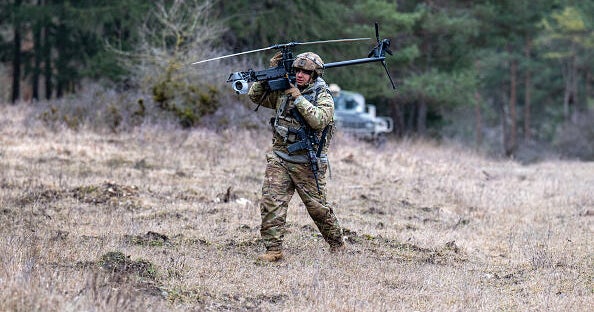Meta has officially partnered with the defense startup Anduril Industries to create military products that integrate artificial intelligence (AI) and augmented reality (AR). This collaboration aims to equip soldiers with real-time battlefield intelligence, significantly enhancing their decision-making capabilities during operations. Announced on Thursday, the partnership signals a larger trend of tech companies venturing into military applications, with prominent figures like Meta’s CEO Mark Zuckerberg and Anduril’s co-founder Palmer Luckey leading the charge.
| Article Subheadings |
|---|
| 1) Partnership Overview and Objectives |
| 2) Technological Innovations in Military Operations |
| 3) Background of Anduril Industries |
| 4) Leadership Perspectives |
| 5) Implications for the Future of Defense |
Partnership Overview and Objectives
On Thursday, Meta and Anduril Industries unveiled their strategic partnership to develop advanced military technologies. This collaboration seeks to leverage AI and AR, aiming to deliver essential, real-time data to soldiers on the ground. The integration of these technologies is expected to redefine how military personnel process and react to battlefield information.
According to Anduril, these innovations are anticipated to drastically improve decision-making speed and accuracy for troops in high-stakes environments. By employing cutting-edge algorithms and data visualization techniques, soldiers will receive insights that were previously unavailable or severely limited in scope.
Technological Innovations in Military Operations
The proposed technologies include unmanned vehicles and advanced aerial systems, both designed to function autonomously in high-risk scenarios. These systems will utilize AI capabilities to analyze their surroundings, thus enabling swift and effective responses. With this advancement, the margin of error can be significantly reduced, potentially saving lives and resources.
Incorporating AR can facilitate enhanced situational awareness, offering soldiers immersive data overlays that provide contextual information about enemy positioning and environmental challenges. This level of insight aims to ensure that battlefield strategies are based on the most current and comprehensive information available.
Background of Anduril Industries
Founded in 2017, Anduril Industries has rapidly emerged as a significant player in the defense sector. Unlike traditional defense contractors like Boeing and Lockheed Martin, Anduril distinguishes itself by not relying on federal funding to innovate and enhance its products. The company’s focus is on independently developing unmanned systems equipped to identify and neutralize threats using AI technologies.
Notably, Anduril’s founder, Palmer Luckey, is well-known for his work in the virtual reality sphere. As the co-founder of Oculus, which was acquired by Meta for $2.3 billion in 2014, Luckey brings a wealth of experience in developing cutting-edge tech that prioritizes user interaction and decision-making efficiency.
Leadership Perspectives
The collaboration has been warmly received by key figures in both organizations. Mark Zuckerberg, the co-founder and CEO of Meta, expressed pride in this initiative, emphasizing how it aligns with the company’s long-term commitment to building technologies that serve vital societal needs. In his statement, he remarked on the crucial role that these innovations will play in supporting American servicemembers.
Palmer Luckey, while addressing the potential impact, mentioned that the integration of AI into military systems represents a paradigm shift. In a recent interview, he stated,
“It’s a scary idea…but that’s the world we live in.”
This comment reflects a growing acceptance in the tech community about the blending of advanced technologies with military operations.
Implications for the Future of Defense
The collaboration between Meta and Anduril Industries raises several important questions regarding the future of defense technology. As military operations increasingly rely on cutting-edge tech, concerns around ethics, privacy, and security measures emerge. The rapid deployment of AI and AR in the battlefield could lead to unforeseen consequences that necessitate regulatory frameworks to govern their use.
Furthermore, the move heralds a potential shift in how defense contracts and technology collaborations are structured. As tech companies engage more with military applications, we may see a transformation in the procurement process, prioritizing agility and innovation over conventional methods.
| No. | Key Points |
|---|---|
| 1 | Meta collaborates with Anduril Industries to leverage AI and AR for military applications. |
| 2 | The partnership aims to provide soldiers with real-time battlefield intelligence. |
| 3 | Anduril differentiates itself by focusing on innovative solutions without federal funding. |
| 4 | Leadership from both companies supports the initiative and acknowledges the associated risks. |
| 5 | The collaboration may reshape the future of military contracts and defense technologies. |
Summary
The partnership between Meta and Anduril Industries signifies a crucial step in the integration of technology within military operations. By introducing advanced AI and AR systems, soldiers are expected to experience significant enhancements in their capability to analyze and respond to battlefield conditions. While the collaboration offers numerous advantages, it also raises essential ethical concerns that will need to be addressed as the technology evolves.
Frequently Asked Questions
Question: What is the purpose of the Meta and Anduril partnership?
The partnership aims to develop military products that integrate artificial intelligence and augmented reality to provide soldiers with real-time battlefield intelligence.
Question: How does Anduril differ from traditional defense contractors?
Anduril focuses on developing products without reliance on federal funding, setting itself apart from companies like Boeing and Lockheed Martin.
Question: What technologies are being developed under this collaboration?
The collaboration is focused on creating unmanned vehicles and aerial systems that utilize AI for autonomous operation in military settings.
